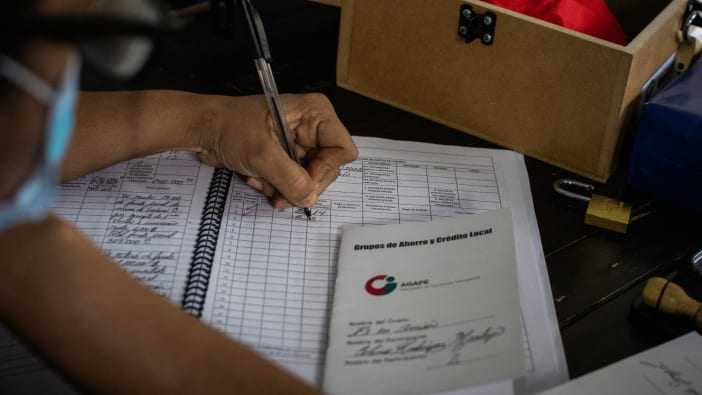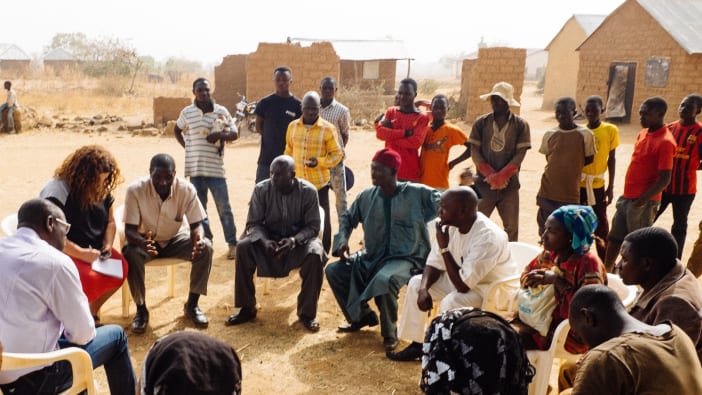by Dennis and Meredith Murnyak.
The Fish Farming Project is a training and extension programme in northern Tanzania begun in l984 as part of the holistic ministry of the Evangelical Lutheran Church of Tanzania (ELCT). It promotes and teaches basic techniques on raising tilapia fish in ponds dug in earth. The project focuses on working with subsistence farmers to raise fish as food for their families and for sale to increase their income. However, their ideas for training could be used in many other types of development work.
It began in a small area of Babati District, but soon spread throughout the Arusha Region and to other parts of Tanzania. Although the project is small with a relatively low budget, it has been able to help 15 partner organisations begin an Integrated Fish Farming Programme, has trained 500 volunteer motivators and assisted Tanzanian families to build over 4,000 fish ponds to raise tilapia.
Why has the Fish Farming Project been successful?
- It uses simple technology in aquaculture.
- Tilapia provide fast results.
- There are no free handouts (farmers build their own ponds, buy their fingerlings, and sell their own harvest).
- The programme staff are committed, capable, and dedicated.
- It centres around a system of volunteer motivators selected by their communities.
- The programme is long-term.
Farmers are selected by their communities to be trained and serve as volunteer motivators. They attend a two-week training course at the ELCT’s Integrated Agricultural Training Centre in Babati District. After this, motivators promote, teach and demonstrate fish farming within their communities. They also supervise fish farmers and record and report on activities to the organisation supporting the fish project in their region. They meet regularly with other motivators in their area to learn from and encourage one another and coordinate activities. One motivator will usually work with ten fish farmers.
A crucial question
What motivates the motivators, many of whom are subsistence farmers themselves? This is a question we have often asked when we see the amount of time and energy many of the motivators put into their work. Some of the factors we have identified show that motivators:
- want to help others
- believe that fish farming can help fight hunger and malnutrition
- feel satisfaction from being part of the project team
- sense their accountability to the project trainers and their own community
- appreciate the respect they receive as the fish farming ‘expert’ in their village.
The enthusiasm and dedication of some of the volunteer motivators has been remarkable, as shown in the three case shown in the boxes below.
Advantages of using volunteer motivators
- The programme can keep costs low and cover a large area
- They live in the area and know the local language and customs.
- They keep knowledge in the hands of the local people.
- They do not depend on outside funding.
The motivators themselves developed guidelines to help communities select motivators. They decided these people should be:
- permanent members of their community
- literate
- respected members of their community
- good farmers
- unselfish
- self-controlled and not heavy drinkers of alcohol
- actively interested in fish farming.
Motivator training course
Each two week training course is held at an agriculture training centre of the ELCT with about 20–35 participants from different parts of the country, selected by their communities. Three or four training courses have been held each year. No fees are charged to participants, but the partner organisations cover all their travel expenses. No payments are given to participants during the course.
The course covers all basic fish farming techniques, ranging from the selection of pond sites to preserving fish after harvest. The course has an equal balance of class work, practical field work, and field visits to farmers and motivators. Lessons taught in the classroom are practised in the field and reinforced during visits to fish farmers.
Problem-posing approach
The course does not simply pass on information. Instead, it encourages participants to learn to use their own experiences, knowledge and skills to solve problems associated with fish farming, building up confidence in their own abilities.
For example, during one exercise on stocking fish, participants are asked to take fingerlings from one pond and stock them into another pond. They are not told that the first pond contains several species of fish. They net the pond, sort the fish and select the size they want for stocking. However, if they do not realise the pond has mixed species, they will stock several different types of fish into the new pond. When this is pointed out, it provides a useful starting point for discussion on the effect of mixed species on production. It also challenges the participants to draw on their experiences from agriculture and animal husbandry.
During the training course, posters, role play and stories are used to show real-life situations associated with promoting fish farming, such as poor community response, apathy, dishonesty and theft. Participants are encouraged to think about and discuss different ways of solving these problems. They draw upon their own experiences and skills, often not directly related to fish farming. This builds their confidence to solve problems creatively and become more self-reliant.
Nearby farmers and motivators in the programme are also invited to share in teaching the course. At the end of the course participants take a written exam and are evaluated on their participation in field work. Before leaving they prepare a work plan and set goals for the next year. The project staff will use these plans during their follow-up visits to the farmers. There is a closing banquet during which participants receive a certificate, a training manual, and a cap with the slogan ‘Fuga samaki’ (‘Raise fish’) on it. They usually leave the course excited about fish farming and eager to begin work as motivators.
The Fish Farming Project with its training system and volunteer motivators has worked well in Tanzania, thanks to all the farmers and motivators who have generously given their time in helping others learn how to raise fish and to fight hunger within their communities. Our experience and methods may be useful in many other types of development work and in other countries. We encourage Footsteps readers to give it a try!
Dennis and Meredith Murnyak worked for many years with ELCT in Arusha Diocese and can be contacted via E-mail: [email protected]
Further information on these excellent training courses can be obtained from Integrated Agricultural Training Centre, PO Box 631, Babati, Tanzania.
Full details of fish farming techniques can be found in the manual Raising Fish in Ponds, mentioned on page 14 and summarised in Footsteps 25.
Fish-stocking exercise
In the classroom, participants learn about harvesting, transporting and stocking fingerlings in ponds. They practise these techniques in some of the centre’s 40 fish ponds. Since small fish are delicate, they learn that fish should be transported as quickly as possible without unnecessary delays. During one of the field days, participants are given the full responsibility to harvest fingerlings from a farmer’s pond and to stock them in a pond in another village. The trainers plan for the route to pass by a local tea shop. As they go past, one trainer will invite the group for a cup of tea and some bread. Often the participants will forget the lesson and gladly accept the offer, leaving the fish in buckets outside the shop. While the group drinks their tea, the fish usually begin to suffer. When the participants return and find the fingerlings gulping at the surface of the buckets, they are reminded of the classroom lesson, and realise the mistake they made. Sometimes when visiting a motivator several years later, they will laughingly talk about the lesson they learned that day and the mistake they have not made again!
Why are the motivators excited after the training course?
- Trainers are committed, capable and believe in fish farming.
- Participants learn by hearing, seeing and doing.
- Visits to fish farmers and motivators in the training area help them see the possibilities of fish farming.
- Motivators have been stimulated and challenged.
- Motivators feel confident about their new skills.
- They know that they will be accountable to the community and to trainers during follow-up visits.









